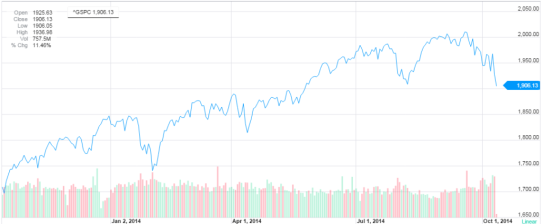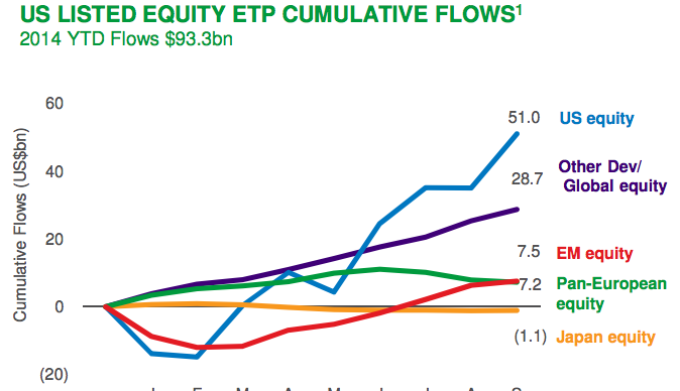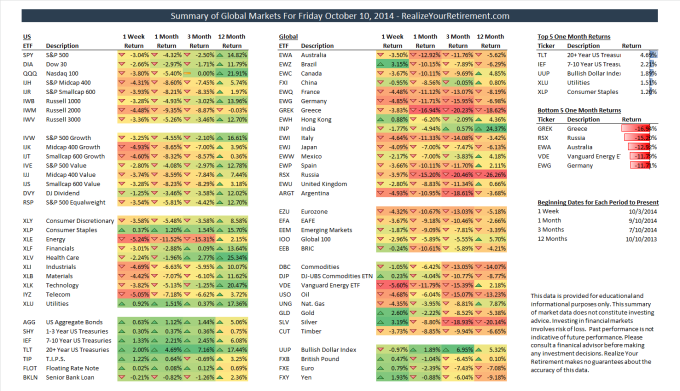Financial News Friday – October 10, 2014
Over the past few weeks we’ve seen the S&P 500 lose much of the ground it has gained this year. As of today it’s dipped below the previous low in August, but it’s still up by around 15% from a year ago (once you take dividends into account) and only about 5% off its all-time highs.
With the market volatility of the past month, many investors are worried about where the market will go from here.
We have not had a market correction since 2012 and this market is ripe for one. Most bull markets have multiple pullbacks on their march to the top. Many investors may panic at this point, but it’s important to stay calm, especially if you are properly diversified and have safeguards in place to manage your risk. Emotional decisions due to short term fluctuations in the market almost always undermine long term returns.
However, despite the current market volatility, the underlying economic activity in various sectors of the US is still strong, therefore, even if we have a correction, it’s unlikely to lead us into a recession.
While we may not be in danger of a recession, I would not be surprised if we saw the S&P 500 retreat an additional 5% from its current state before stabilizing.
Which ETFs Are We Buying This Year? (Reformed Broker)
Up until recently, US equities have been retail investors’ favorite market. Blackrock provided this helpful chart in a recent report. As you can see, the largest flows have been to US equity, with the second highest to developed markets. Investors will often pile into hot markets, only to panic when the market has a correction (like we may be going through right now). There will likely be large outflows from US equities this month as investors respond to the increased market volatility by selling out of stocks.
Diversification Sucks (Bason Asset Management)
Here’s a great article about why diversification can be so difficult for investors.
“Let’s face it. Being a diversified investor is terrible.”
“You will always be worse than the best performing asset class (and you will always compare your performance to the best asset class, because your brain is terribly designed for investing). For this reason your portfolio’s performance will always seem mediocre.”
Here’s a particularly relevant piece to this week’s market declines in US markets:
“That part of your portfolio that you love will turn on you in a flash. You’ll hate it, and you won’t ever remember loving it. International stocks led the charge for years leading up to the financial crisis, and have since been lackluster. We are fickle and almost never satisfied. We expect good performance and we don’t want to be around for the bad times, as if we can predict or control what happens in the markets.”
Supreme Court Decision On 401(k) Fee Case Could Have Domino Effect (Investment News)
A recent Supreme Court case regarding excessive fees in 401(k)s could have lasting effects in the 401(k) management industry. The case revolves around a plan advisor’s duty to act in the best interest of plan participants by choosing the least costlyversion of an available investment.
For example, advisors should utilize institutional class shares rather than the more expensive retail shares of the same fund. Many brokerage companies are likely worried about this ruling, but it simply enforces what advisors should have been doing for plan participants the entire time, acting in their best interests and monitoring the plan.
San Francisco Legalizes, Regulates Airbnb With 7-4 Vote, Lots of Amendments (TechCrunch, Reuters)
Airbnb has become legal in its home city of San Francisco. Airbnb enables residents to rent out a room in their residence, or their entire home, to other users of the website.
Many users of Airbnb have come to depend upon this extra income, so city officials devised some limits on the service to raise revenues for the city and regulate the number of days a user can rent out their home using the service. Essentially, residents who use the service have put themselves in a legal gray area in many cities.
Many have so many customers staying in their residential homes and apartments that they run afoul of zoning restrictions and laws that govern hotels. Now that Airbnb has become a legitimate avenue for short term subletting and renting in San Francisco, we’re likely to see other cities follow suit.
Summary of Global Markets for Friday October 10, 2014
Click the image above to zoom in and see the full Global Market Summary.



